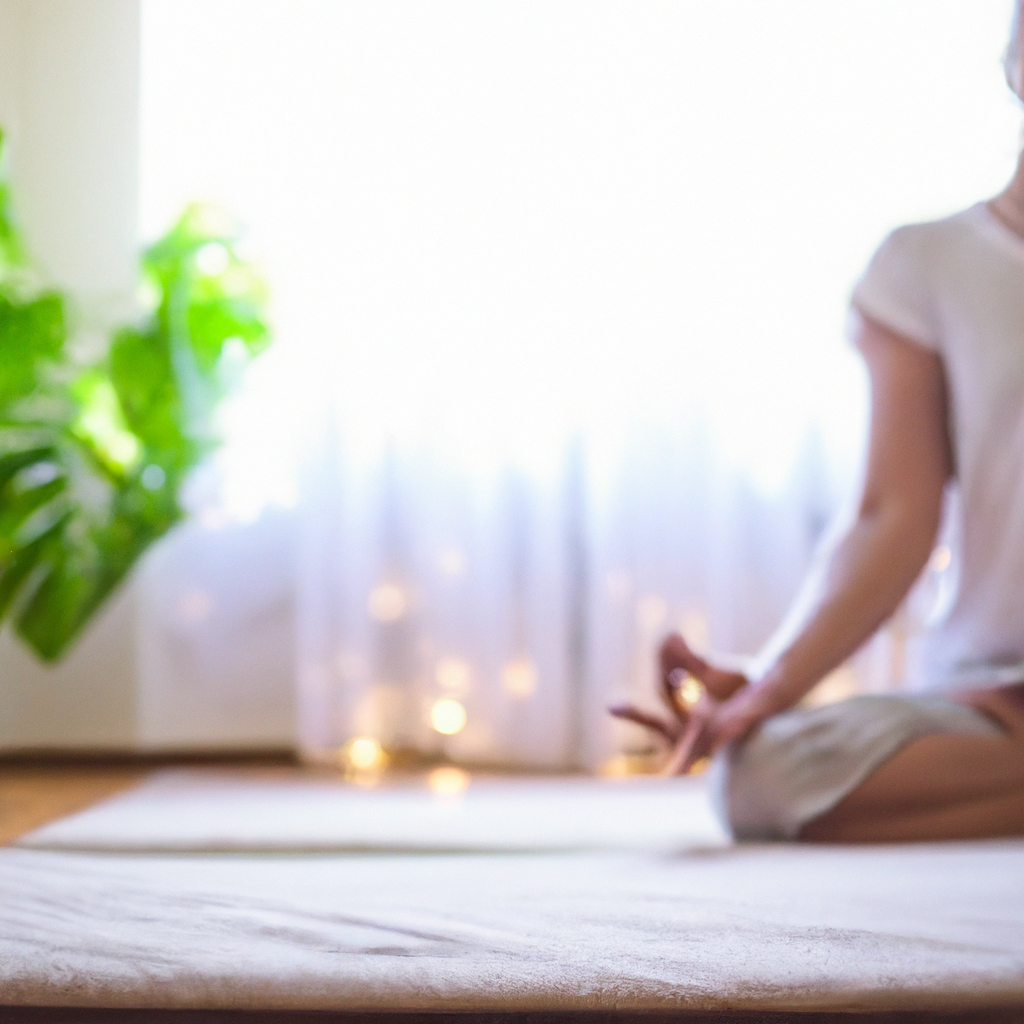Imagine having a bedroom that not only offers a peaceful haven but also promotes your well-being. In this article, we will explore how to design a smart bedroom that incorporates wellness-oriented features, such as integrated yoga and meditation guidance. By combining technology and tranquility, you can create a space that not only helps you relax but also supports your mental and physical health. Let’s dive into the world of wellness-centered bedroom design and discover how you can create a serene sanctuary that nurtures your body and mind.

Creating a Wellness-Oriented Smart Bedroom
Understanding the Importance of a Smart Bedroom
In today’s fast-paced world, where stress and distractions are a part of daily life, it’s essential to have a sanctuary that promotes relaxation and overall wellbeing. This is where a wellness-oriented smart bedroom comes into play. By combining technology, comfort, and wellness features, you can create an environment that supports rejuvenating sleep, reduces stress, and enhances your overall quality of life.
Integrating Wellness Features
To create a wellness-oriented smart bedroom, it’s crucial to incorporate various wellness features. These features should aim to optimize your sleep quality, enhance relaxation, and promote a healthy environment. Let’s explore some of the key wellness features you can integrate into your smart bedroom.
Smart Lighting and its Impact on Sleep
Lighting plays a vital role in regulating our circadian rhythms, which directly affect our sleep-wake cycle. By incorporating smart lighting solutions, you can create a bedroom environment that aligns with your natural sleep patterns. Warm-toned lights promote relaxation, while adjustable lighting settings allow you to customize the lighting for different activities, such as reading or winding down.
Temperature Control for Optimal Rest
Temperature also plays a significant role in ensuring a good night’s sleep. Smart thermostats and climate control systems enable you to set the ideal temperature for optimal rest. By creating a cool and comfortable sleep environment, you can avoid disturbances and promote a deeper, more restful sleep.
Air Quality Management
The quality of the air we breathe has a direct impact on our sleep and overall health. Poor air quality can disrupt sleep patterns and lead to respiratory issues. Introducing air purifiers and filters in your smart bedroom can help remove pollutants and allergens, ensuring a clean and healthy breathing environment. Additionally, incorporating plants into your bedroom can naturally filter the air, adding a touch of nature and improving air quality.
Soundscapes for Relaxation
Sound has a profound effect on our relaxation and sleep. Incorporating white noise machines or sound apps can help mask external noises and create a calm atmosphere for sleep. Additionally, nature-inspired sounds, such as ocean waves or gentle rain, can evoke a sense of tranquility, aiding relaxation and promoting a more peaceful sleep environment.
Creating a Digital Detox Space
In today’s digital world, it’s important to create a space in your bedroom where you can disconnect from technology and allow your mind to unwind. Designating a screen-free zone in your smart bedroom helps reduce the negative impact of screen time on sleep. Instead of reaching for your phone or tablet, consider alternative activities like reading a book, journaling, or practicing yoga and meditation.
Choosing the Right Technology
When designing a wellness-oriented smart bedroom, it’s essential to choose the right technology that aligns with your goals. Here are some key technologies to consider integrating into your smart bedroom.
IoT Devices and Home Automation
IoT devices and home automation systems allow you to control various aspects of your smart bedroom, including lighting, temperature, and sound, with a simple voice command or through a mobile app. By integrating these devices, you can easily create a personalized environment that caters to your wellness needs.
Smart Mattresses and Bedding
Investing in a smart mattress or bedding can significantly enhance your sleep experience. These innovative products utilize advanced technologies to monitor your sleep patterns, adjust temperature and firmness, and provide personalized sleep data to help you optimize your sleep quality.
Integrating Wearable Devices
Wearable devices, such as smartwatches or fitness trackers, can seamlessly integrate into your smart bedroom ecosystem. These devices often come with sleep-tracking features that provide valuable insights into your sleep patterns and help you make informed decisions to enhance your sleep quality.
Sleep Trackers and Apps
There is an array of sleep trackers and apps available that can monitor your sleep quality, provide personalized sleep recommendations, and even offer guided relaxation exercises. By leveraging these technologies, you can gain a deeper understanding of your sleep patterns and make necessary adjustments for better sleep.
Yoga and Meditation Guidance Tools
Yoga and meditation are well-known practices that promote relaxation and improve sleep quality. By incorporating smart yoga mats or meditation cushions, you can benefit from guided sessions that help you unwind, relieve stress, and prepare your mind and body for a restful night’s sleep.
Smart Lighting and its Impact on Sleep
Understanding Circadian Rhythms
Circadian rhythms are our body’s internal 24-hour clock that regulates various physiological processes, including sleep-wake cycles. Light exposure directly affects these rhythms, signaling our body to either stay awake or prepare for sleep. By understanding the importance of circadian rhythms, we can design our smart bedroom lighting to align with these natural patterns and promote better sleep.
Choosing Warm-Toned Lights for Relaxation
Warm-toned lights, such as those with a yellow or orange hue, promote relaxation and help prepare the body for sleep. These lights emulate the warm glow of sunset and are less likely to disrupt melatonin production, a hormone that regulates sleep. By opting for warm-toned lights in your smart bedroom, you can create a soothing and calming atmosphere conducive to bedtime routines and unwinding.
Adjustable Lighting Settings for Different Activities
A wellness-oriented smart bedroom should cater to your different needs throughout the day. By integrating adjustable lighting settings, you can easily transition from bright and energizing lights during the morning to dim and relaxing lights in the evening. This flexibility allows you to create the ideal ambiance for various activities, whether it’s getting ready for the day or winding down for a restful night’s sleep.

Temperature Control for Optimal Rest
Importance of Temperature in Sleep Quality
Temperature plays a crucial role in determining the quality of our sleep. Too hot or too cold temperatures can disrupt our sleep patterns and lead to restlessness. To optimize your sleep quality, it’s important to create a sleep environment with the ideal temperature range that promotes relaxation and comfort.
Smart Thermostats and Climate Control Systems
Smart thermostats and climate control systems allow you to precisely regulate the temperature in your smart bedroom. These technologies enable you to set the temperature to your preference, ensuring a cool and comfortable sleep environment. By programming your smart thermostat to lower the temperature slightly before bedtime, you can induce sleepiness and promote a more restful sleep.
Creating a Cool and Comfortable Sleep Environment
Maintaining a cool environment in your smart bedroom is essential for optimal rest. Experts recommend a temperature range between 60-67 degrees Fahrenheit (15-19 degrees Celsius) for the most comfortable sleep. By incorporating technologies like smart fans or air conditioners, you can create a sleep-promoting environment that helps you fall asleep faster and stay asleep throughout the night.
Air Quality Management
The Influence of Air Quality on Sleep and Health
Air quality plays a significant role in our overall wellbeing, particularly when it comes to sleep. Poor air quality can result in irritated airways, allergies, and disturbed sleep patterns. By ensuring good air quality in your smart bedroom, you can create a healthier sleep environment and promote restful sleep.
Air Purifiers and Filters
Introducing air purification systems and filters in your smart bedroom can effectively remove pollutants, allergens, and other harmful substances from the air. These devices work by filtering out particles and improving air quality. With cleaner air, you can breathe more easily and enjoy a refreshing sleep experience.
Plants for Natural Air Filtration
In addition to air purifiers, incorporating plants into your smart bedroom can provide natural air filtration. Plants such as peace lilies, spider plants, and snake plants are known for their ability to filter toxins and release oxygen. Not only do they improve air quality, but they also add a touch of nature to your bedroom, creating a calming and rejuvenating atmosphere.

Soundscapes for Relaxation
The Impact of Sound on Sleep and Relaxation
Sound plays a significant role in our ability to relax and fall asleep. External noises, such as traffic or noisy neighbors, can disrupt sleep and lead to poor sleep quality. By integrating soundscapes into your smart bedroom, you can mask disruptive noises and create a serene environment conducive to relaxation and sleep.
White Noise Machines and Sound Apps
White noise machines and sound apps generate a consistent sound that helps drown out background noises. These devices emit a soothing sound that mimics the frequency of external disturbances, making them less noticeable and promoting a peaceful sleep environment. From gentle rainfall to steady waves, there are various sound options available to suit your preferences.
Nature-Inspired Sounds for Tranquility
Nature-inspired sounds have been found to have a calming effect on the mind and body, helping us relax and unwind. By incorporating nature-inspired sounds, such as chirping birds or rustling leaves, into your smart bedroom, you can create a tranquil atmosphere that promotes deep relaxation and restful sleep. These sounds can be played through smart speakers or sound apps, allowing you to immerse yourself in the soothing wonders of nature.
Creating a Digital Detox Space
The Negative Effects of Screen Time on Sleep
Excessive screen time before bed can have detrimental effects on our sleep quality. The blue light emitted by electronic devices suppresses melatonin production, disrupts circadian rhythms, and makes it harder for us to fall asleep. To promote a wellness-oriented smart bedroom, it’s important to create a designated space free from screens and technology.
Designating a Screen-Free Zone
Designate a specific area in your smart bedroom where electronic devices are not allowed. This screen-free zone should be a place where you can unwind, relax, and prepare your mind and body for sleep. By separating your digital devices from your sleep environment, you reduce the temptation to engage with screens before bed and promote a healthier, more restful sleep routine.
Alternative Activities for Unwinding
To replace screen time before bed, consider alternative activities that help you unwind and relax. Reading a book, writing in a journal, practicing gentle stretches, or engaging in a calming hobby can all be excellent ways to transition from the busyness of the day to a more peaceful state of mind. These activities can be done in your designated screen-free zone, creating a peaceful environment to wind down before sleep.

Yoga and Meditation Guidance Tools
Benefits of Yoga and Meditation for Sleep
Yoga and meditation are ancient practices that have long been associated with relaxation, stress reduction, and improved sleep. By incorporating yoga and meditation into your smart bedroom, you can enhance your sleep quality and overall wellbeing.
Smart Yoga Mats and Meditation Cushions
Smart yoga mats and meditation cushions are innovative tools that provide guidance and support during your practice. These devices often come with features such as sensors to detect your posture, gentle vibration reminders, and built-in speakers to guide you through yoga poses and meditation techniques. By incorporating smart yoga mats and meditation cushions, you can enhance your practice and create a more immersive and relaxing experience.
Guided Sessions through Smart Devices
Smart devices such as smartphones or smart speakers can provide guided yoga and meditation sessions through various apps or voice commands. These guided sessions offer step-by-step instructions, soothing music, and calming voices to help relax the mind and prepare the body for sleep. By harnessing the power of technology, you can make your smart bedroom a sanctuary for mindfulness and rest.
Incorporating wellness features into your smart bedroom creates a holistic sanctuary that encompasses all aspects of your wellbeing. By understanding the importance of a wellness-oriented smart bedroom, integrating wellness features, and choosing the right technology, you can transform your bedroom into a haven of relaxation and rejuvenation. With a wellness-oriented smart bedroom, you can optimize your sleep quality, reduce stress, and enhance your overall quality of life. So, why wait? Start designing your wellness-oriented smart bedroom today and unlock the potential for a more restful and revitalizing sleep experience.
